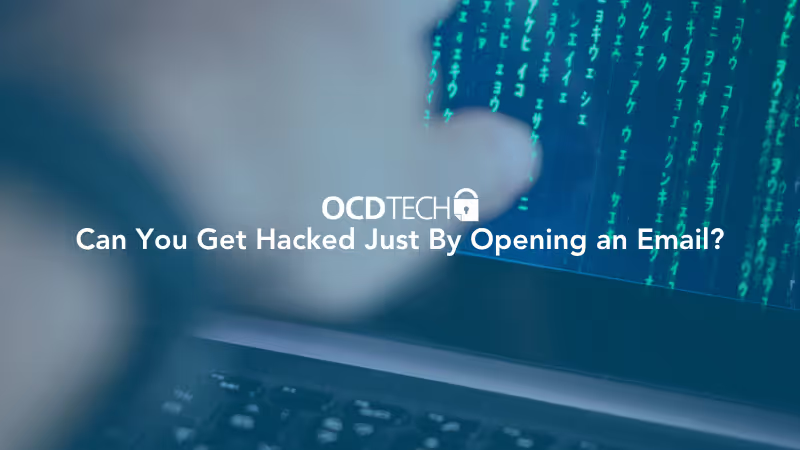By
OCD Tech
•
3
min read

Opening an email is something most of us do dozens of times a day — at work, on our phones, or while scrolling before bed. But every so often, a warning surfaces: “Don’t even open that email — it’ll hack your computer!”
So, is that really possible? The short answer: not usually. Let’s break down what’s true, what’s exaggerated, and how to protect yourself from real email security threats.
Emails remain one of the most common tools for cybercriminals. They’re used to deliver phishing attacks, malware, or social engineering scams designed to trick users into revealing personal data or credentials.
These techniques rely on user interaction — meaning the real danger typically begins after you click, download, or respond, not just by opening the message.
Here’s the good news: in most modern systems, simply opening an email will not get you hacked.
Email clients like Outlook, Gmail, and Apple Mail display messages in a secure, sandboxed environment that prevents scripts from running automatically. They also block external content — such as hidden trackers — unless you explicitly allow it.
However, there are exceptions. Outdated email software or devices missing security updates can contain vulnerabilities that allow malicious code to run automatically. This is rare today, but it’s one reason why keeping your systems patched is so important.
The biggest risks come from interacting with the email’s content. Here’s where users often get into trouble:
In short, reading an email won’t hurt you — but engaging with it carelessly might.
If you accidentally open a spam or phishing email, don’t panic — but do act carefully.
Quick action can limit potential damage and help your security system adapt to new threats.
Defending against email-based attacks requires both technology and awareness:
You won’t get hacked just by opening an email — but the moment you click, download, or trust the wrong message, you open the door to risk.
The safest strategy is simple: pause, verify, and think before you click.
With the right awareness and security measures in place, individuals and businesses can drastically reduce their exposure to phishing and malware — keeping inboxes, and reputations, far safer.

Audit. Security. Assurance.
IT Audit | Cybersecurity | IT Assurance | IT Security Consultants – OCD Tech is a technology consulting firm serving the IT security and consulting needs of businesses in Boston (MA), Braintree (MA) and across New England. We primarily serve Fortune 500 companies including auto dealers, financial institutions, higher education, government contractors, and not-for-profit organizations with SOC 2 reporting, CMMC readiness, IT Security Audits, Penetration Testing and Vulnerability Assessments. We also provide dark web monitoring, DFARS compliance, and IT general controls review.
Contact Info
.svg)
OCD Tech
.svg)
25 BHOP, Suite 407, Braintree MA, 02184
.svg)
844-623-8324
.svg)
https://ocd-tech.com
Follow Us
Videos
Check Out the Latest Videos From OCD Tech!
Services
SOC Reporting Services
– SOC 2 ® Readiness Assessment
– SOC 2 ®
– SOC 3 ®
– SOC for Cybersecurity ®
IT Advisory Services
– IT Vulnerability Assessment
– Penetration Testing
– Privileged Access Management
– Social Engineering
– WISP
– General IT Controls Review
IT Government Compliance Services
– CMMC
– DFARS Compliance
– FTC Safeguards vCISO